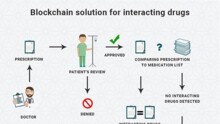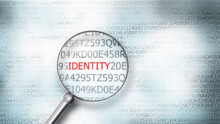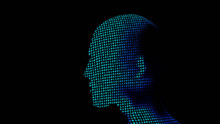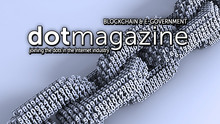Blockchain

Feature "Blockchain"
How Web3 Improves Transparency, Security, Trust & Compliance
Gherardo Varani, Head of Business Development at Freename, on why consumers increasingly distrust the traditional web. Web3 offers solutions for security, trust, and compliance, using decentralization to protect data across extensive networks, ensuring transparency and user control.

Feature "Domains"
Tokenization of the Internet Address Space
Alexey Shkittin, CEO of InterLIR, and Alexander Timokhin, COO, propose transitioning from a hierarchical to a decentralized IP registry system using blockchain technology.

Feature "Blockchain"
Security and Privacy in Blockchain Environments
Matteo Cagnazzo and Chris Wojzechowski, both researchers at the Institute for Internet Security, explore how security and privacy can be enhanced by blockchain technology.

Feature "Blockchain"
Blockchain & The Cloud: Transforming Data Center Architecture for Tomorrow
Data centers have to adapt to new business strategies and adopt new technologies to keep pace with their customers’ needs. Anthony Robinson from Corning Optical Communications explains how data centers can facilitate the rapidly increasing data traffic from the always-on consumer.

Feature "Identity Management"
Self-Sovereign Identity Technology meets Identity & Access Management
Sebastian Weidenbach from esatus AG explores whether Self-Sovereign Identity can deliver what it promises for identity & access.

Feature "Blockchain"
How to Manage Customer Digital Identities – What’s the Best Way?
Volker Zinser from Ubisecure looks at how best to implement customer ID management sustainably and how to leverage the process for greater business success.

Feature "Blockchain"
Blockchains: A Cure for the e-Health Record Problem?
Electronic health records (EHRs) have been a long time coming. Is blockchain technology a solution for the difficult issues of data privacy and patient autonomy? Dr. Christina Czeschik of Serapion explores the potential and shortcomings of using a blockchain for EHRs.

Feature "Blockchain"
How Could Digital Identities and Blockchain Make our Lives Easier?
Sebastian Beyer from CERTIVATION GmbH explains how digital identities and blockchain could make our lives easier.

Feature "Blockchain"
Blockchain Technology: A Must for Modern and Forward-Looking IT
Martin Przewloka, CDO of msg group automotive, explains how blockchain can be utilized in marketable products, and how companies can develop prototypes.

Feature "e-Government"
E-Government on Blockchain: About Obstacles and Chances
Public administration offers and requires the same properties as blockchain: transparency, trust, and immutability. But does this predestine blockchain to be suitable for all e-government processes? Volker Skwarek explores potential use cases.

Feature "Blockchain"
When Does a Company Blockchain Project Make Sense?
Beyond the hype: Not every project will be better with a blockchain, and every blockchain project will need to be individually conceived. Yannik Heinze from Chainsulting explains the pros and cons and favorable conditions for company blockchain projects.

Feature "Cybersecurity"
Smart Contract Security – Expect and Deal with Attacks
In a world where smart contracts are executed by a network of mutually distrusting nodes without a central authoritative entity, security plays a pivotal role. However, security matters are often neglected – with dire consequences, as Dr. André Kudra points out.

Feature "Blockchain"
Blockchain-based Solutions and IT/Cyber Security for Autonomous Driving – Legal Barriers
The great complexity of the technical processes used in connected and autonomous cars leads to complex legal requirements. Two attorneys-at-law from DWF Germany, Klaus M. Brisch and Marco Müller-ter Jung, explore the raft of associated implications – spanning contract and liability issues to issues of IT and data security – and conclude that legal innovations at European level might enhance further technical progress.

Feature "Blockchain"
Crypto-currencies – High Prospects Despite Low Reputation?
New methods of conducting payments and bank business have been developed since the early days of the Internet; Credit cards, direct debit cards, and e-money transactions are widely accepted and increasingly popular. However, all these payment methods require two things: banks and a regulated currency. With the emergence of blockchain technology, new payment methods have evolved, which claim to make banks and regulation unnecessary. What are these crypto-currencies, what are their benefits, and do they really have an impact on the banking and financial world? Daniel Groß, Attorney at Law, DWF Germany, Cologne, explains.

Feature "e-Government"
Government Blockchain Infrastructure – A Chance for Europe
Blockchain offers governments the opportunity to revolutionize their handling of citizen data and the allocation of rights in secure e-government scenarios. Dieter Rehfeld argues for the development of a European public-sector blockchain infrastructure, establishing Europe as a leader in the area, and giving data control back to citizens.

Feature "Blockchain"
Blockchain for Education: Lifelong Learning Passport
How blockchain can be used for educational qualifications to provide a guarantee of authenticity for digital certificates. An illustration based on the Blockchain for Education platform.

Feature "Cybersecurity"
Securing Smart Contracts
Smart contracts, based on blockchain technology, are software programs that offer a very secure and transparent way of documenting and automating business processes. But as software programs, they are not immune to security vulnerabilities, as Professor Alexandra Dmitrienko explains.

Feature "Blockchain"
Blockchain and Data Protection Law: When Anonymous Data Becomes Personal
Data processing on a blockchain is widely perceived to be completely anonymous and therefore “immune” to data protection laws – which are applicable only for processing of personal data. However, this perceived immunity is not at all absolute – rather, data processing on a blockchain may fall under data protection laws. Lawyers Natalie Eichler and Thorsten Jansen demonstrate some current and future applications of blockchain technology where data protection laws may in fact apply.

Feature "Blockchain"
Creating a Federated Blockchain as a Service Platform
Kevin Wittek from if(is) outlines the possibilities for creating a federated blockchain operated by infrastructure providers who are eco members.

Feature "Blockchain"
The Need for Naming Conventions on the Blockchain
Blockchains have not yet developed a unified naming convention, and it’s time they did, argues Christa Taylor from Minds + Machines.

Feature "Blockchain"
The Tricky Task of Separating the Legitimate from the Illegal Use of Crypto Mining
Used transparently, crypto mining can offer website owners a new source of revenues aside from online advertising. Ralf Benzmueller from GDATA, one of the authors of the new eco Association whitepaper on the legitimate use of crypto mining, gives an overview of the potential of crypto mining.

Feature "Blockchain"
Blockchain - What's What?
How does a blockchain actually work? Stephan Zimprich, Leader of the Competence Group Blockchain in eco – Association of the Internet Industry, explains the key concepts and terms behind blockchain technology.

Feature "Company Security"
Blockchain & IoT: Blockchain’s Most Exciting Prospects Have Nothing To Do With Money
The most prominent example of what blockchain can do are currencies such as bitcoin. It is, arguably, also the most boring example — not because blockchain is boring, which it isn’t, but because money is boring. As Mathias Röckel explains, the more exciting prospects have to do with traditional industries – and the creation of new business models.

Feature "Blockchain"
Simplifying Complex Tasks and Reducing Errors with Blockchain
As more and more of our business processes become digital, companies are continually facing the challenge of ensuring not only the security of their systems and secrets, but also confirming the validity and veracity of external documents like contracts, invoices and payment advice. Blockchain can help to face these challenges, as Judith Ellis explains.

Feature "Blockchain"
How Blockchain Can Help Make Email Better
Patrick Ben Koetter from the eco Association explores blockchain solutions for email and the need to bring the whole email ecosystem to the table.
Industry Insights "Blockchain"
The Need for Naming Conventions on the Blockchain
When Does a Company Blockchain Project Make Sense?

Feature "Blockchain"
The Time is Now: The Need for Government Blockchain
Blockchain technology offers massive potential for state administration. Stephan Zimprich, Leader of the eco Competence Group Blockchain, looks at how this foundational technology could transform e-government.
Industry Insights "Blockchain"
Moving the French Administration into the Cloud

Feature "e-Government"
Creating Trustworthy E-Government Services with Blockchain
Digitalizing government services requires the entire process of storing and handling the data of citizens to be revolutionized. Taavi Kotka, former Chief Information Officer of the Estonian Government, explains the value of e-government services to a country, and how blockchain helps to overcome the hurdles to transformation.
Industry Insights "e-Government"
Government Blockchain Infrastructure – A Chance for Europe
E-Government on Blockchain: About Obstacles and Chances

Feature "Blockchain"
What Can Blockchain Do For You?
“The Internet never forgets!” Although untrue, this statement reminds people to think twice before putting information online – and out of their control. The advent of blockchain changes everything. Blockchain forgets nothing – and it brings back content control. Mathias Röckel looks at the potential of this new technology for innovative commercial enterprise, as well as for Internet infrastructure providers.

Feature "Data Protection & Privacy"
Data Protection and Blockchain
Data protection plays a major role in many blockchain-based project ideas, and presents issues which are not always easy to resolve, as Stephan Zimprich, Leader of the eco Competence Group Blockchain, explains.
Industry Insights "Data Protection & Privacy"
The Tricky Task of Separating the Legitimate from the Illegal Use of Crypto Mining

Feature "e-ID"
Blockchain for Securing Digital Identities
With more and more people and IoT devices connecting to the Internet, solutions are needed to authenticate unique digital identities. The eco Association looks at ways to alleviate the digital identity crisis and to offer users a secure online ID on the basis of blockchain.

Feature "Blockchain"
The eco Blockchain Governance Framework – eBGF
Prof. Norbert Pohlmann & the team from if(is) explain how eco’s Governance Framework creates a root of trust for the operation of a consortial blockchain.

Feature "Cybersecurity"
Trust & Security in the Blockchain
The early use cases for blockchain technology centered around cryptocurrencies. But the same processes that secure Bitcoin and friends can also be used for securing other forms of data, for example in administration. So, what is it that makes blockchain so secure? Professor Norbert Pohlmann, from the eco Association, explains.
Industry Insights "Cybersecurity"
Securing Smart Contracts
Smart Contract Security – Expect and Deal with Attacks

Feature "Blockchain"
doteditorial: Blockchain & E-Government – Giving Citizens Control of Their Data
E-Government is a major driver of blockchain technology. Stephan Zimprich from fieldfisher looks at how the transparency and immutability of blockchain can help give citizens digital self-determination.
Industry Insights "Blockchain"
Blockchain for Education: Lifelong Learning Passport
Blockchain Technology: A Must for Modern and Forward-Looking IT

Feature "Industrial IoT"
doteditorial July 2017
How will the fourth industrial revolution transform business culture and industry? What are the social benefits of industrial IoT? And how can small and medium-sized companies keep up with the pace of change in modern manufacturing? The July 2017 issue of dotmagazine, “Digital Production” explores the brave new world of Industry 4.0 – what’s already happening, how to adapt, how to ensure security, protect intellectual property, and how to succeed using digital production methods.

